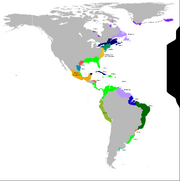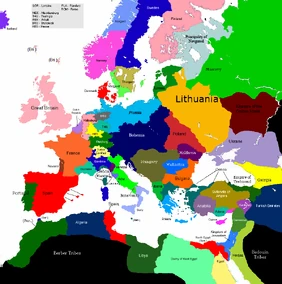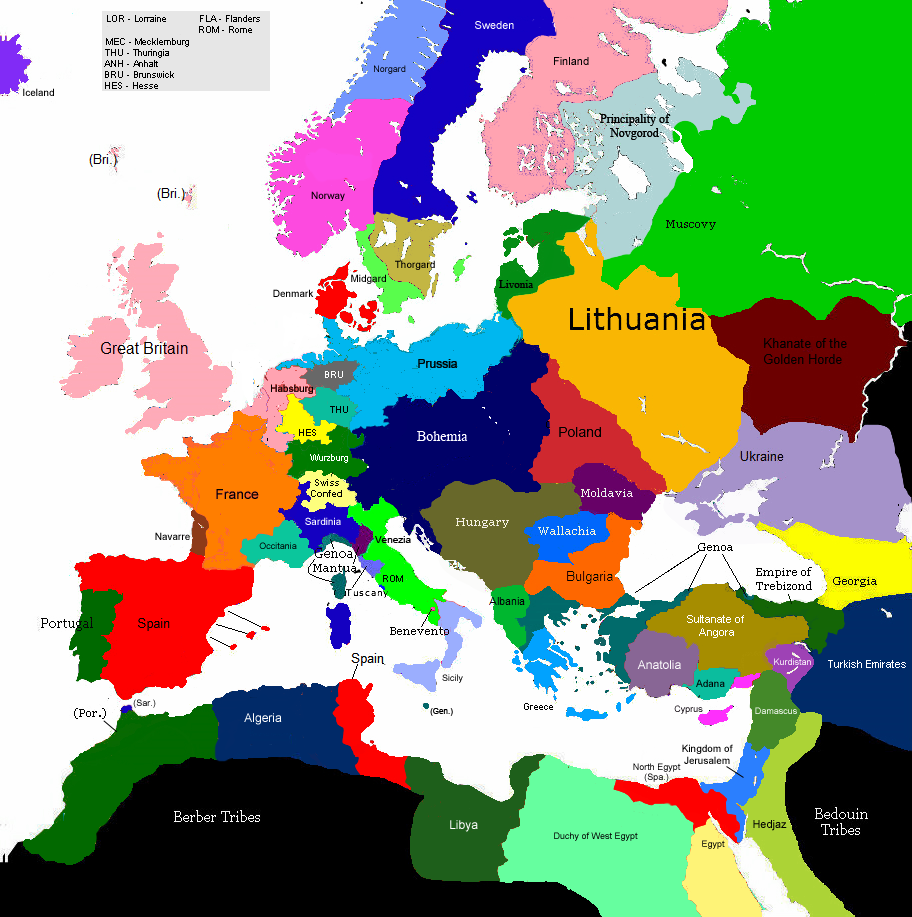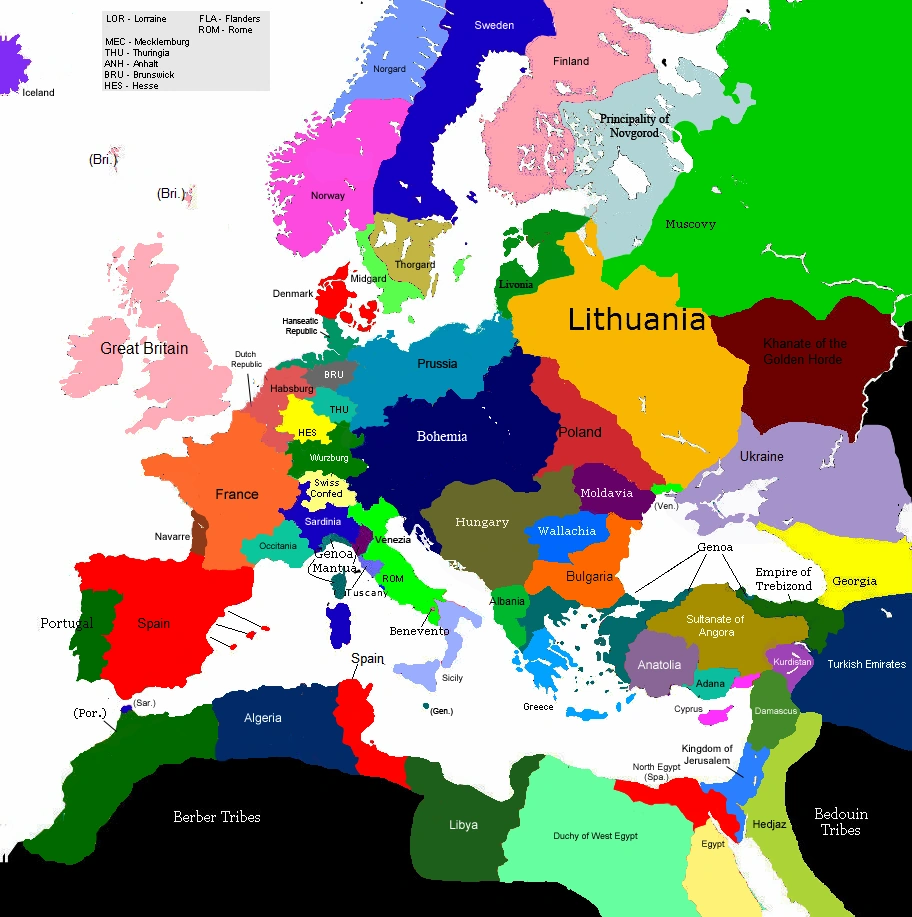Back to Europe 1430 (Map Game)
1523[]
- Morocco Revolts from Portugal
- The King of Sweden died
- Islam spreads throughout the Balkans
1524[]
Frederick II of Prussia became Duke of Mecklenburg and Prince of Anhalt, uniting both into the Kingdom of Prussia. In his new lands, he began building houses for the nobility and establishing Prussian porcelain factories.
Calvinist missionaries spread out among some of native Americans, and gain many converts. Calvin himself moves from Switzerland to Prussia. Many bourgeois among the Baltic nations convert, as do a sizable minority of tradesmen (carpenters, smiths, furriers, etc.)
1525[]
Frederick II of Prussia is alarmed at the growth of Calvinism. He has John Calvin arrested, tortured, and executed. Frederick II then closes off Prussian borders to any further Calvinists and arrests those already living in Prussia.
Calvinist merchants, angered at the death of Calvin, close trade with Prussia over his death. Switzerland cuts off diplomatic contact with Prussia, as does Livonia and the Hanseatics. Navarre becomes majority Calvinist, and the religion spreads among the nobility of Iberia. The Portuguese king Pedro III converts, and much of the merchant class follows.
1526[]
Frederick II of Prussia has the remains of John Calvin defiled by ripping out his heart and feeding his bones to the dogs. He made sure no one, not even the court, found out. Besides that, he begins his considerable reforms:
Frederick encouraged internal trade, by removing most trade barriers, building the Frederick Road, and by establishing merchant houses. Frederick made the economy of Prussia self-sufficient by introducing the use of tulips as a crop, introducing the Danish crop-rotation system, and liberating serfs from feudalism. Frederick also established mines and blacksmith houses.
Sweden almost completely converts to Calvinism.
1527[]
Frederick II established the Prussian Municipal Policing Force, the first of its kind in Europe. The force's job was to "maintain order in the localities, to make sure the laws were executed in a organized manner, and to execute the orders of the local courts". Frederick II also established a fire-fighting department and a local lawyer's department, allowing people for the first time to seek legal counsel in civil trials.
Calvin's son, Anthony, publishes his (at this time radical) views on religious freedom and government. Quoting the chapter on religious freedom, he writes, "While my faith in God is absolute, so is my belief that the only way to truly come to be one one of his saved is to come to it under one's own total free will. Anything else is a fallacy, and an insult to the omnipresent power of the Word." On economics, he writes, "While many believe that donating money to the poor is a direct path to the Lord, this is false. This only stagnates the progressive development of the human condition. If welfare is removed, then poor people will seek jobs, expand the economy, and foster the coming of Him. This, in the long run, improves the human condition more than any charity. Nay, this self-improvement is the only true charity." His reforms are enacted throughout Calvinist Europe, and it's traders quickly gain ground against the Prussian rivals due to the improvement of the economic basing, although Prussian trade and commerce remain strong.
1528[]
Sweden annexes Livonia, and establishes the General Staff, which greatly improves logistics and tactics for Sweden. They also sign a non-aggression pact with Prussia, due to the growing fears of a Continental war.
Frederick II reorganized the Prussian army. He created a reserve of 50,000 soldiers, initiated Prussian discipline and organization codes, and reformed the Prussian professional army. He introduced modern European military technology and also introduced more comfortable uniforms. His reforms made Prussia's army the most feared in Europe. Frederick also banned the publication of Anthony Calvin's heretical book on welfare. The death penalty was imposed on anybody who even smuggled in a copy.
Anthony publishes a pamphlet on the proper role of government. It is widely circulated and re-printed across Europe. It states that the only role the government should have is courts, police, enforcing citizen's rights against the government, and the military. It calls for complete free speech, religion, etc. Shipments of the pamphlets are smuggled in to Prussia, and many peasants and merchants across Europe feel they have been short-changed by the nobility.
1529[]
Frederick II of Prussia imposed tariffs on trade with all countries except Sweden, whom he opened free trade with. Frederick also established the Prussian Navy, building three galleys and ten warships. Frederick's spies also found out about the smuggling in of the pamphlets, and he has all people who have read or even bought the pamphlets tortured (by raping them or beating them) and executed. Frederick establishes the Prussian Royal Police to root out any potential suspects.
King Pedro III of Portugal, reading the pamphlets, gives up his throne and establishes the Federal Republic of Portugal, based on the Swiss model. He sends descrete aid to "liberty conventions" all over Europe, as do most of the Calvinist nations. Brunswick and Lithuania become majority Calvinist, however, they keep the monarchy. For now...
Sweden begins expanding its merchant marine, and set up dozens of sawmills in the Finnish forests, to make shipbuilding much cheaper.
1530[]
The Pope of Toledo excommunicates the former King Pedro III of Portugal for "abolishing a Catholic throne and for adopting heretical ideals". The Pope also excommunicates John Calvin (although he is dead, this is called after-life ex-communication) as well Anthony Calvin and the king of Sweden. The Pope hails the actions of king Frederick II of Prussia as "A step back towards God's Grace". Anthony writes in his weekly newsletter, "It is quite humorous, in a cosmic sort of way, for a mere human, as demented as the rest of us, to assume that he can command God, the creator of the Universe, to send other humans, just as sinful as him, into hell. How can one be elected by evil, sinful human beings (not that us Calvinists are not) and then act like God suddenly agrees with every thing he says. Humorous, indeed. But humor is one of the more dangerous things to play with when matters concerning God are discussed. I do not profess to know or understand what God plans for Earth; However, the Pope does, and I don't believe an inkling of it. AS I have always said, follow the Word, do good acts, and never give up hope that the Lord will return."
The Swedish merchant marine begins to expand even faster, as they adopt fore-and-aft sails. a Swedish sawmill owner begins using water power for other things, like powering several foundries. this makes Swedish iron the highest quality in the world.
Frederick I of Habsburg dies and is succeeded by his son Charles. He is very intelligent, literate in most major European languages and promises to be a great king as he is also a great military leader. He also forges closer relations with Great Britain and Prussia.
1531[]
The Swedish merchant marine now controls half the Baltic trade, and there is a large Swedish fleet which carries coal from all over Europe and Nova Scotia to the quickly expanding Swedish iron industry. several factories are established in Sweden which use water power to build iron stoves out of replaceable parts. these stoves are a huge boon to the Swedish, and they help most of their population survive the hard winters
Charles of Habsburg reorganizes the army of Habsburg by introducing conscription, a staff system, and a new officer system to improve the size and quality of the army.
1532[]
Sweden begins establishing textile mills powered by water. several innovations allow for the rapid rise in textile manufacturing in Sweden: one which allows one person to spin five threads at the same time, and another which allows for greater use of water power.
With an army of 15,000 troops, Habsburg invades, and quickly overruns, Flanders.
1533[]
The Swede's begin manufacturing their ships using a system of replaceable parts, and improve their navy's cannons with trunnions, trucks and bagged charges. they also develop a flintlock musket and begin building a factory specifically for their manufacture. Prussia immediately signs a treaty, gaining all this technology, and build flintlock factories of their own.
Habsburg invades Lorraine, though this country has a larger army than Flanders and a more sophisticated officer system, they fall also within the same year of invasion.
1534[]
The Swedes develop the worlds first field artillery. they also develop a water-powered boring machine that lets them bore almost identical bores, reducing windage and increasing accuracy. this boring device also manufactures artillery much faster than traditional techniques. This technology is discovered by the Prussians as well, who have lured several Swedish and Danish engineers and scientists to their side with promises of land and money.
1535[]
Prussian scientist Nicholas Copernicus discovers that the Earth and all the planets orbit the Sun, and that it is only one of several millions of stars in the Universe.
The first poorly built Prussian factory literally fails to run at all. Frederick is extremely frustrated, but his inexperienced workers failed to construct any of his new factories to their designers specifications. This ends Prussia's industrial expansion for the next couple years. they would instead import flintlocks and cannons from Sweden, who has more than enough, and concentrate on their military.
Genoa adopts the Swedish shipbuilding innovations.
1536[]

Americas
- After years of debate, the Swedish annexation of Livonia having no legal bearing, is rejected by the Livonian nobility and the international community, returning power to the duke of Livonia.
- Their planning complete, the Brunswick Pact nations sweep into Habsburg to liberate Flanders and put an end to the Habsburg threat. With the combined forces of Prussia, Saxony, Wurzburg, Hesse, Brunswick, Thuringia, and the Hanseatic Republic, the Habsburg forces rout and King Charles is captured. A Regency council is established for the Charles' young son with representatives from each German nation represented. The King's son will be of age to take the throne in 12 years.
- Venice steps up its colonization plans with the huge profits they are making from the importation of New World goods and gold.
- Portugal, with aid from Spain, brings Morocco back under control.
- The King of Denmark passes Odin's Law, stating that no man who rejects the gods may sit the throne of Denmark.
- The King of Greece, Doge of Genoa, and dukes of Albania and Bulgaria begin campaigns to stamp out Islam in the Balkans.
- The King of Bohemia marries his youngest son to the daughter of the Duke of Hungary. No joining of the nations will result from this but relations between the two become much closer.
- Denmark establishes several fur trading posts along the northern coast of North America.
- Most major seafaring nations have adopted fore and aft sails for their smaller ships, including the Hanseatic Republic, Bohemia, Great Britain, Denmark, Genoa, Sardinia and Portugal.
- Venice adopts the Swedish shipbuilding techniques and begins investing in newer technologies.
- Other colonies in the New World expand.
Make sure to read the talk page before posting: regarding turns.
1537[]
 Frederick the Great inherits the throne of Saxony. He consults Bohemia on the issue, and with the King's agreement, annexes Saxony. The King of Bohemia no longer thinks Saxony is important. The other German States approve the annexation as well.
Frederick the Great inherits the throne of Saxony. He consults Bohemia on the issue, and with the King's agreement, annexes Saxony. The King of Bohemia no longer thinks Saxony is important. The other German States approve the annexation as well.
Finand revolts against Sweden's rule, and becomes independent. Sweden is seriously weakened by this.
The King of Denmark, Odin II, who passed Odin's Law, dies, and is replaced by his son, Eric. Although Eric acted like a paganist in public, in private he was a Catholic, reading his Bible at night, when nobody was awake. King Eric II immediately issued the Lord's Law, which repealed Odin's Law and proclaimed Denmark a Catholic country once again. The paganist Temples of Denmark were abolished, and Eric himself was baptized and christened. The Pope is delighted at Eric's conversion, and sends him papal letters of welcome.
1538[]

Americas
- Eric's Brother Harold along with the Nobles of Denmark execute Eric for Treason and decrees that the Lord's Law was invalid as a Christian King was illegal in the first place. The majority Asatru populace celebrates the move.
- The Hussite areas of southern Saxony in Prussia revolt and join Wurzburg and Bohemia before the Prussian military can put down the revolt in the North. Hussitism spreads to Hesse, the duke of which converts.
- Bohemia approaches all the Hussite Nations to create the Hussite League, a mutual defense alliance. If attacked, the Hussite nations will respond. Signatories of the treaty include Bohemia, Venice, Wurzburg, Hungary and Hesse.
- New World colonies expand.
1539[]
Frederick the Great abolishes the Church of Prussia and adopts the Roman Catholic religion as the official state religion. Frederick also increases the mobility of his military, hoping to crush any revolts quickly in the future.
Meanwhile, a man in Denmark, named Richmen, a secret Catholic, gathered a Christian army together and overthrew King Harold and his "heretical pagans". Richmen forces the population to convert to Roman Catholicism, and he binds Denmark with the Catholic Church. The Pope of Rome is more then pleased and calls him "the savior of the North".
1540[]

Americas
- Richman's actions spark civil war across the north, including the Asatru dominated portions of Sweden, when the dust fades many new nations emerge. Catholic Denmark, and Asatru Iceland, Midgard, Thorgard, Norgard, and Norway. With Denmark still continuing to fight the Asatru populace at home, Iceland claims the New World colonies.
- France and Occitania begins construction on a small atlantic fleet in order to claim some of the new world before its all taken.
- Read prev. posts Sweden converted to Calvinism!!!!
1541[]
Frederick II of Prussia reorganized the Prussian taxing system, establishing a clarified tax code, imposing more indirect taxes, and establishing a uniform system of state expenditures, debt, and revenue. His reforms over-fill Prussia's treasury with money, so much he has to build five treasury depositories, but other rulers refuse to adopt his reforms. Frederick also builds an exploratory fleet of five warships and a galley, sending it to North America to establish a Prussian colony. New Prussia is established to the northeast of the Mayan Kingdoms, and relations with the Mayans are opened.
1542[]
Prussia, Lithuania, Poland, Thuringia, Hanseatic Republic, and Flanders declare the creation of their own mutual defense alliance called the Germanic League. They almost instantly antagonize the Hussite League, members of both leagues soon begin to mobilize troops.
Livonia, Finland, Switzerland, Navarre, Genoa and Portugal create the Concordat of Europe, a neutral, mainly Calvinist alliance, that quickly begins to dominate the banking and credit systems. All the Calvinist pressure from the peasants and merchants forces Swedish nobles to recreate Sweden, and they join the Concordat. They begin to play the two other competing alliances off against one another.
Calvinist influence expands throughout Britain and Lithuania. Lithuania, already staunchly Calvinist, splits from the GL but becomes neutral.
1543[]
The Pope hires assassins who kill Anthony Calvin and bring his body to the Pope, who then has it burned in public. The Pope orders Calvin's left-over bones thrown to the dogs.
Because of the decline of Calvinism after Calvin's death, Lithuania reenters the Germanic League.
Thousands of Catholics denounce the Pope's order to kill Calvin, and competing, "true" popes arise in Avignon, Cologne, and Split. An angry supporter of the Cologne pope detonates grenades arranged around St. Peters' inner sanctum, where 20 of the 34 cardinals were in attendance. All were killed, and Catholic Europe breaks into anarchy. The Pope's guards kill the Cologne, Avignon, and Split popes. The Pope has the supporter of the Cologne pope captured, beaten, and thrown to the dogs, then his flesh displayed in public.
1544[]
The Pope issues the Doctrine on the Church, proclaiming Hussitism and Calvinism "heretical religions". He excommunicates the king of Bohemia for following this religion.
Brittany becomes a autonomous duchy in France, after military confrontations and civil manifestations.
Catholic Germany breaks from the Pope, who establishes the Papal Inquisition, really a assassins organization that turns most of Umbria into a war zone.
Hussites and Calvinists begin to have talks on what to do on what they call "that particular institution of Italy" and decide to allow Catholics to worship openly.
As Switzerland is firmly Calvinist, the Pope directs the Inquisition to protect him directly.
1545[]
Frederick II of Prussia expanded the Prussian military again. By now it has 160,000 active soldiers and a reserve of 100,000. Frederick II also granted a limited amount of religious toleration to Hussites in Prussia.
The Pope has his assassins kill the Calvinist and Hussite leaders of Bavaria, Switzerland, Livonia, and a whole lot of other "heretical nations". In Great Britain, Emperor Richard I issues a decree that prosecutes British Calvinists by arresting many of them and throwing others into dog-dens, where dogs eat them.
Calvinist revolts sweep Britain, and the merchants and peasants tough out the nobility and establish a federal republic much like Portugal's and Switzerland. After the revolt, Richard I and some of the nobility flees Britain, and heads out to the colony in South America. In the former South American colony, they form the Kingdom of Britannia. Bavarians go at the Inquisition office in Germany human-wave style, and kill all the leadership. Jurgen Heeld, a Pomeranian Calvinist who operates the Monthly Germany, a newspaper, makes them look like martyrs, and many follow their example throughout Europe. Christopher van Childe, a Calvinist philosopher, issues the Declaration of Peace, which calls for an end to the bloodshed in Europe. The kings of the Germanic kingdoms sign as does Sweden, Genoa, and Portugal, and the Councils of Britain and Switzerland.
No, Frederick abolished the Church of Prussia and became a Catholic
1546[]
King Frederick the Great of Prussia and the Pope both refuse to sign the Declaration of Universal Peace, calling it a "heretical Calvinist document" and instead arm themselves. Both the Pope and Frederick kill Calvinists in large numbers in their kingdoms and rule with oppression over their peoples. The army, completely loyal to them, stamp out any resistance.
Calvinist author Franscais Voltaire begins writing a trilogy on government and religion in a Swedish monastery in Lappland.
1547[]
The Pope's assassins raid the Lappland monastery and kill Franscais Voltaire, having learned from Catholic loyalists in the monastery about his writing the trilogy on government and religion. The Pope has the script burned, and he excommunicates the leaders of Venice and Genoa.
Pro-Calvinist assassins from Venice kill the Pope, but cannot get Frederick II of Prussia, who has loyal guards protecting him. This leaves a power vacuum in the Catholic Church.
1548[]
The dead Pope's son becomes Pope and issues the Bull of Apology, which apologizes to the Calvinists for the deaths of Francais Voltaire, John Calvin, and Anthony Calvin, all of which indirectly or directly linked to the Church. The new Pope also signs the Declaration of Universal Peace and declares a Catholic policy of religious toleration. Frederick II of Prussia still refuses to sign the Declaration, though.
It is found that Voltaire knew of the attack, and, having no escape, and shipped a copy of the manuscript to Stockholm. He writes, " The Good Book itself, the very basis of religion to anybody, Catholic or Calvinist, Hussite and Orthodox, says explicitly that we should love and cherish our neighbors, and that to turn the other cheek is the most holy of acts. This is the opposite of what is being done by what is ostensibly the leadership of the Christian world. By commanding that the good people of the Earth shall turn and strike one who just yesterday tilled the fields alongside him, who laughed and joked and danced with him, is the anti-thesis of what being a Christian is. I can only pray that He will save these poor souls who have suffered long under the Devils' machinations. Pray for your enemy, and if you do, we will find a strength in our peace that is the only true strength. And that is love."
It is highly popular.
Charles' son, Maximilian, ascends the throne as King of Habsburg and disbands the Regency Council. As was agreed at the end of war, Maximilian is instantly recognized by the rulers of the other German states as the King.
1549[]
King Frederick II of Prussia banned publication of Voltaire's "heretic book" in Prussia and killed those who sold or bought it. Frederick II imposed state censorship on all newspapers and books, and he strengthened Prussian border patrol.
Maximilian I of Habsburg launches and invasion of Flanders, this time with support from Prussia, Flanders is easily conquered as the other German states didn't like Flanders for being a member of the Germanic League.
Frederick II of Prussia became Chief Merchant of each of the Hanseatic Republics, and he absorbed the republics into Prussia, with Bohemian approval.
1550[]
The Hussite League declares war on the Germanic League after years of tension, Habsburg takes advantage of their war and invades the Dutch Republic with France. The Dutch Republic falls within days. Prussia remains neutral in all conflicts.
1551[]

Americas
- The Germanic league declares war on Prussia for abandoning its obligations in the alliance.
- The Hanseatic Merchants Council, having gathered international support from Denmark, Habsburg, Sweden, and Great Britain re-asserts the independence of the Hanseatic Republic from what they called the "Illegal Annexation of the Republic" stating "How can a foreign monarch, who is neither a merchant, nor a citizen of the republic, claim to be first merchant of the Republic?". Feeling abandoned by its German neighbors, it allies with like minded nations, Genoa and Venice.
- Venetian forces land on the black sea shore of Poland and Lithuania.
- Hungary and Bohemia move on southern Poland, while Poland and Lithuania make small gains on the heavily fortified northern Bohemia
- Lithuania makes small gains on northern Prussia.
- Bohemia approaches Prussia with an offer of alliance against the Germanic League
- The Newfoundland and Labrador colonies, loyal to the crown of Britain, join Britannia.
- France and Occitania establish colonies in South America
- Venice makes contact with the Inca, with their great riches Venice decides these people are like-minded and sends its most influential merchants to establish trade houses within the Inca Empire.
- More than 50% of the Mayan people have converted to Hussitism.
1552[]
Frederick II of Prussia signs a peace with the Hanseatics and Lithuania, recognizes the territorial loss. He is bitter over his losses, and rebuilds the military, intending to take the Republic back by force.
1553[]

Americas
- Bohemian and Hungarian forces take the Polish capital, forcing peace.
- With 3 enemies surrounding them, Thuringia is soon gobbled up by Prussia, Hesse, and Wurzburg.
- Venice moves further into Poland and Lithuania.
- Lithuania makes gains in northern Bohemia.
- The King of Sardinia and Duke Mantua die in a hunting accident, their children unite the thrones of each.
Back to Europe 1430 (Map Game)













